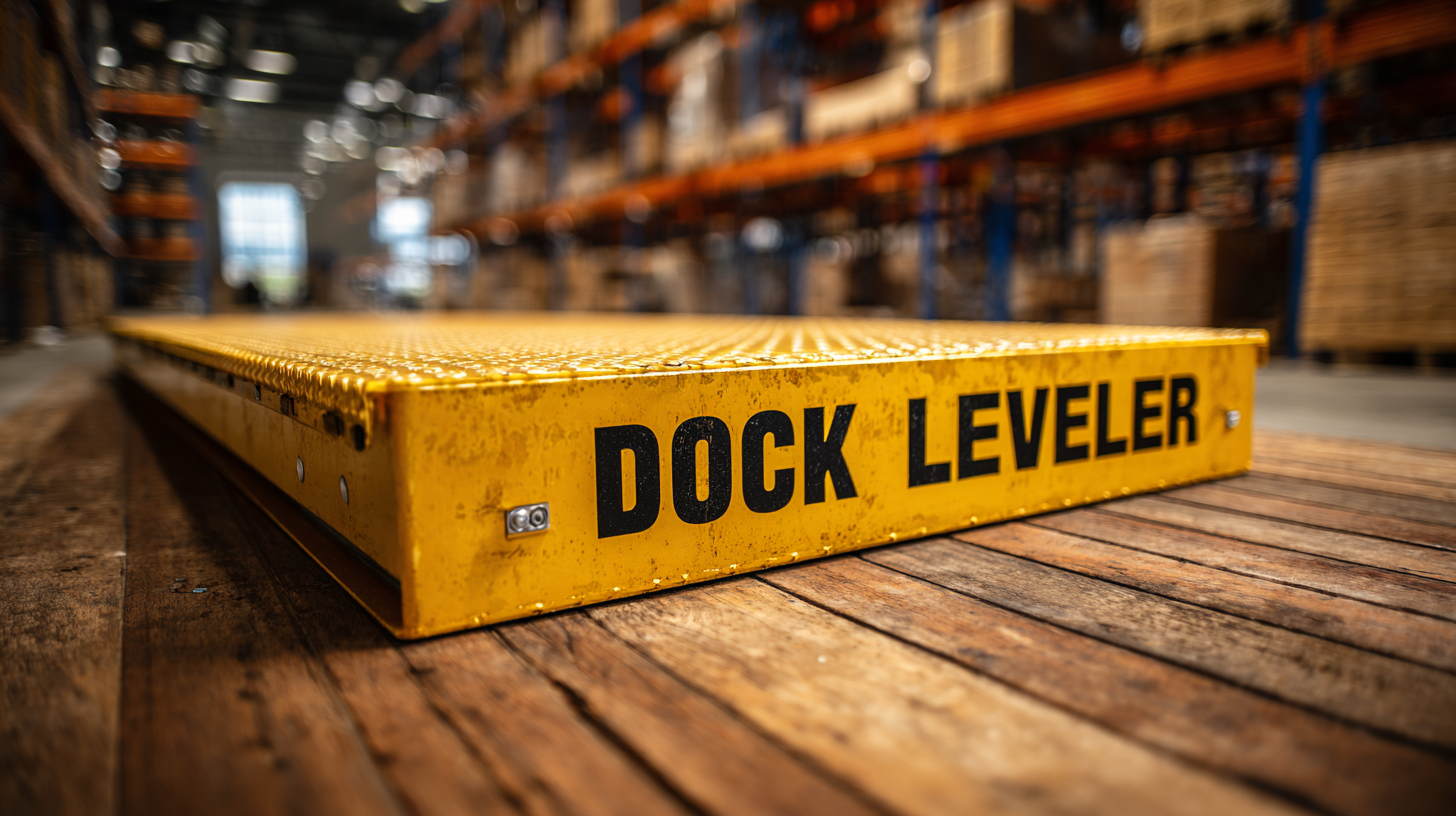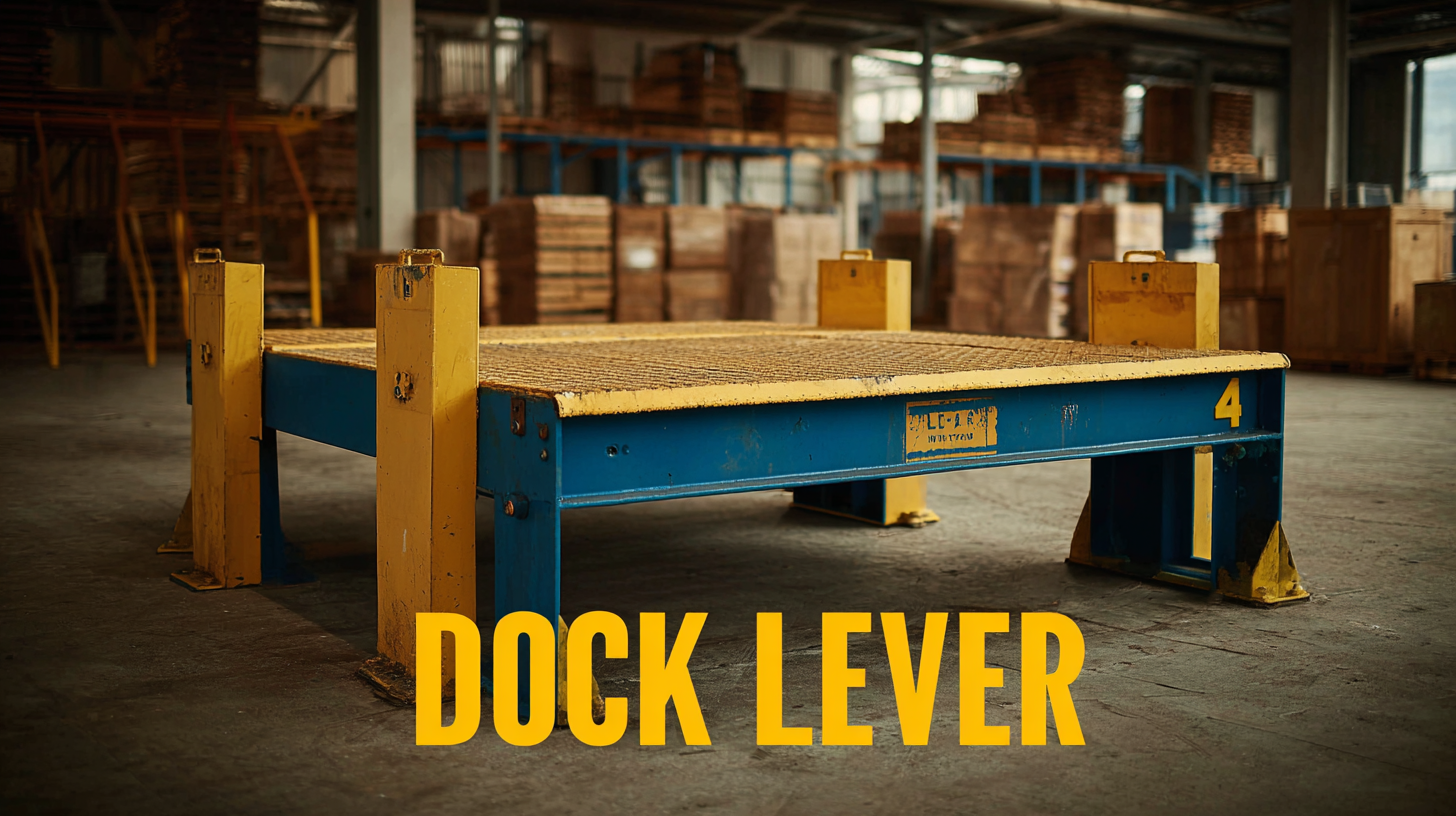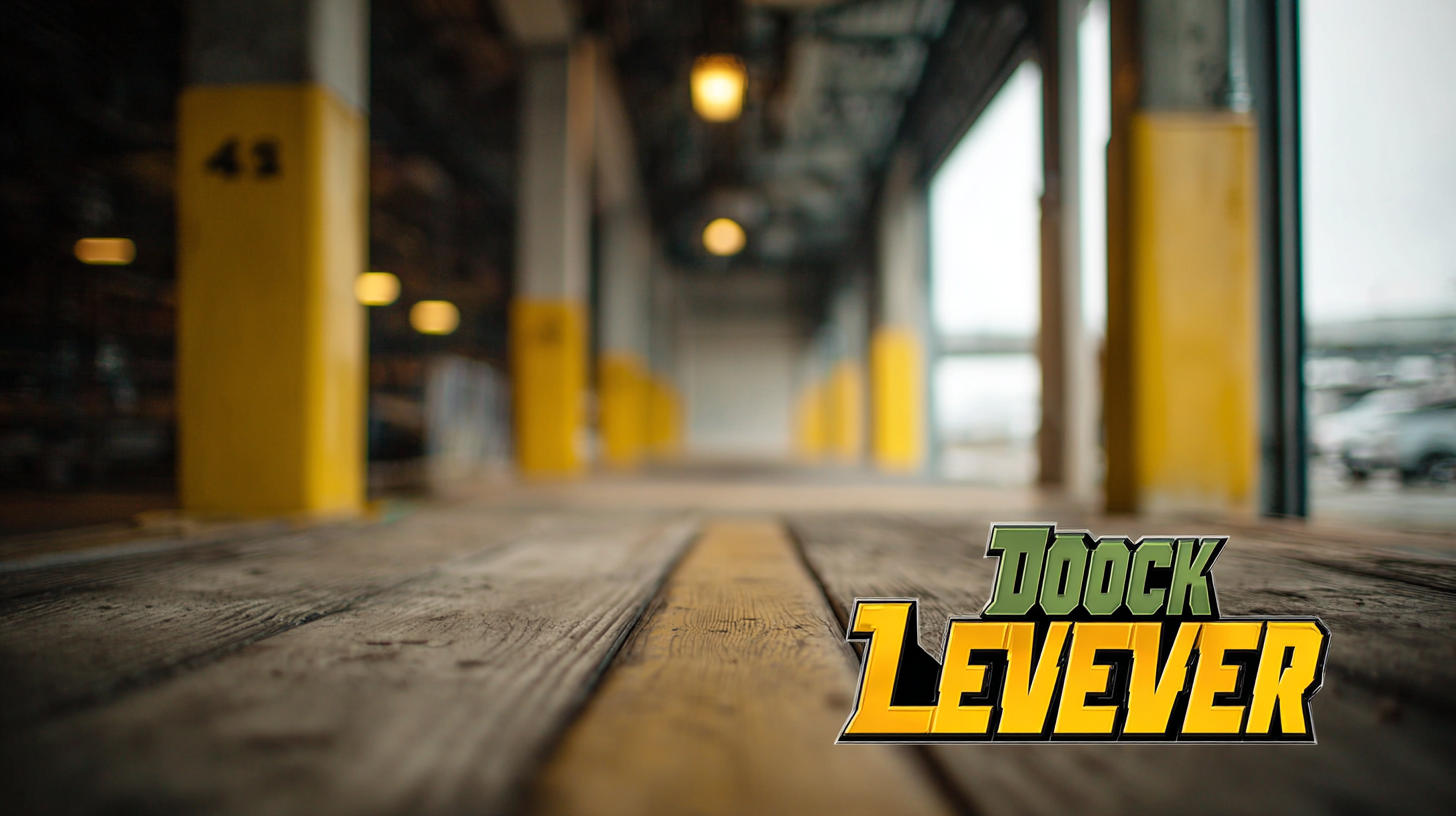You know, dock levelers are pretty much the unsung heroes in the logistics and warehousing world. They make it super easy to load and unload stuff between trucks and loading docks, which is a big deal! Recently, I came across an industry report that says the global dock leveler market is really on the rise, with a growth rate of about 6.3% each year from 2021 to 2026. Pretty impressive, right? Companies like Guangzhou Victorydoor Co., Ltd. are really keen on boosting their efficiency, so picking the right dock leveler is incredibly important. It's not just about getting things done faster; it also plays a big role in safety and the overall durability of operations. By the way, did you know that Guangzhou Victorydoor has been around since 2005? They focus on everything from trade and production to installation and after-sales service of different Industrial Doors. They’ve really carved out a niche for themselves by offering top-notch solutions that meet industry standards. When you're on the hunt for the best dock leveler, don’t forget to consider five key features that are essential for keeping things running smoothly and up to par.

Key Considerations for Load Capacity in Dock Levelers to Ensure Safety
So, when you're on the hunt for the perfect dock leveler, one of the biggest things to think about is its load capacity. I mean, it’s super important because it directly affects safety and how smoothly things run during operations. From what I've seen, dock levelers that are rated right can handle anything from 30,000 to a whopping 100,000 pounds, depending on what you need them for. If you pick a dock leveler that meets or even beats the load capacity you expect, you could seriously cut down on accidents and downtime, which can really cost companies a ton of cash each year.
Plus, let’s not forget that the loading dock is a key point in the whole supply chain, especially in areas like food safety. The way things are loaded can impact everything in the distribution chain for food products. If things are managed well at the dock, it's not just about better efficiency; it's also about sticking to the regulations set by the authorities. This helps boost safety when it comes to handling freight. A tough and reliable dock leveler is a must-have to make sure there's a smooth transition between trucks and the dock, which keeps your goods safe while they're being loaded or unloaded. So, really, investing in the right equipment is super important to lower the risks that come with improper loading techniques and to make sure safety standards are consistently met in your workplace.

Examining Durability: Materials and Construction Techniques for Long-Lasting Levelers
When you’re picking out the best dock leveler, you really can't ignore durability. I mean, the materials used in making it can make a huge difference in how long it lasts and how well it works. Steel is often the go-to because it's super strong and tough, but aluminum levelers can be a nice, lighter option without losing that durability. Picking the right material could save you from the hassle of constant replacements and turn into a solid long-term investment.
And let’s not forget about how these things are built! It’s essential to look for dock levelers that have welded seams and reinforced edges. These features really boost their durability, helping them handle heavy loads and all those pesky environmental stressors. Plus, manufacturers that use advanced coatings can really help fend off corrosion and wear, making sure the leveler sticks around for a while.
A couple of tips I’d throw out there: prioritize levelers made with high-quality materials and solid construction techniques. Oh, and don’t forget to check for warranties or guarantees from the manufacturers – they usually mean the product's reliable. Lastly, think about where you’re going to use it; going for a leveler that's specifically designed for your environment—like if there's a lot of humidity or heavy traffic—will really extend its lifespan.
The Role of Automation: Enhancing Efficiency with Advanced Dock Leveler Features
Choosing the right dock leveler? Well, you definitely don’t want to forget about those automation features! Automated dock levelers are totally changing the game when it comes to loading and unloading. They really boost safety and efficiency, making things a lot smoother. Plus, these high-tech systems can cut down on manual labor and create a much more comfortable workspace for the crew. For example, you can connect automated dock levelers to existing warehouse management systems. That way, you streamline operations and cut down on any downtime during loading—who doesn’t want that?
Here’s a little tip: keep an eye out for dock levelers with interlocked loading dock control systems. These are great because they make sure everything is lined up perfectly before use, which just enhances safety. And let’s face it—who wouldn’t want a more streamlined loading process? It really makes for a more efficient workflow!
The rise of automated tech in loading docks is really exciting. It shows we’re moving toward smarter solutions for warehouses. Features like telescopic designs mean you can adapt to different truck heights easily, which speeds up transitions and boosts loading efficiency. Investing in cutting-edge automation isn’t just a smart move—it can pay off big time over the long haul by optimizing your operations and keeping up with the demands of the fast-paced logistics world.
Oh, and one last tip: definitely look for dock levelers that can integrate with your current automation systems. This compatibility not only enhances functionality, but it helps you get the most out of your investment in both automation and handling gear!
5 Essential Features to Consider When Choosing the Best Dock Leveler - The Role of Automation: Enhancing Efficiency with Advanced Dock Leveler Features
| Feature | Description | Benefits | Automation Role |
| Automatic Leveling | Mechanism that adjusts the dock leveler to align with different truck heights. | Increases safety and efficiency, reduces manual adjustments. | Sensors detect truck height and automatically adjust dock leveler. |
| Load Capacity | Maximum weight the dock leveler can support. | Ensures safety and reliability during heavy loads. | Automated monitoring systems can alert when limits are approached. |
| Durability | Material and construction quality of the leveler. | Longer lifespan, lower maintenance costs. | Automated diagnostic tools can monitor wear and tear. |
| Ease of Use | User-friendliness of operation and controls. | Reduces training time and enhances productivity. | Touchless controls streamline operations and minimize training. |
| Safety Features | Incorporations like edge of dock, lip extensions, and sensors. | Prevents accidents and enhances workplace safety. | Automated alarms and alerts for unsafe conditions. |
Impact of Maintenance Requirements on Dock Leveler Performance and Longevity
So, when it comes to picking the right dock leveler, you really want to keep an eye on how much maintenance it’s going to need. Trust me, a dock leveler that’s well taken care of can run like a champ for years, which means you’ll dodge a ton of downtime and repair bills. There’s even a report from the Material Handling Industry of America that suggests regular maintenance could boost the lifespan of these bad boys by about 20 to 30%! That’s pretty sweet, right? Not only does that help things run more smoothly, but it also keeps safety top of mind—super important when you’ve got a busy loading area.
Now, here’s something to think about: the maintenance needs can really differ depending on the type of dock leveler you choose. Take hydraulic ones, for example. They tend to need a bit more TLC—think more inspections and fluid checks—compared to mechanical ones. If you skip those checks, well, you might find the performance dipping, and that could lead to some serious issues with handling loads. It kind of reminds me of electric vehicle batteries. With the right care, they can last over a decade, and it’s the same deal for dock levelers. When they're properly serviced, they can really stretch their lifespan and give businesses a solid return on their investment, especially if loading and unloading is a big part of the operation.
Evaluating the Importance of Compatibility with Freight Types and Facility Layouts
Choosing the right dock leveler is super important, especially when you think about how it needs to fit different types of freight and the layout of your facility. I came across this 2022 Industrial Dock Equipment Market Report that mentioned almost 35% of delays in warehouses are due to dock equipment not being able to handle various shapes and sizes of freight. So, checking out how your dock leveler interacts with goods like pallets, crates, and even bulk loads is really going to boost both efficiency and safety. Features like adjustable heights and widths are game changers because they let your leveler adapt to different freight types and help prevent damage when loading and unloading.
Then there’s the whole facility layout to consider, which is just as important. A study from 2023 by the National Federation of State High Schools found that around 30% of dock accidents happen because levelers don’t match the facility designs. Knowing your layout helps you figure out how much space you need for everything to run smoothly, so the dock leveler can create seamless transitions between trucks and loading platforms. In the end, investing in a leveler that’s designed to work with your specific freight and is tailored to your facility’s unique layout can really amp up your operational productivity.
Cost-Benefit Analysis: Assessing the Economic Impact of Dock Leveler Selection
So, when you're thinking about which dock leveler to get for your facility, it's super important to do a solid cost-benefit analysis. You really want to make a financially smart choice here! The thing is, the cost of your dock leveler isn't just about that initial price tag. You've got to think about things like how efficiently it works, what kind of maintenance you’ll be looking at down the line, and even the potential downtime if the equipment decides to fail on you. A good dock leveler can really speed up your loading and unloading processes, which means you’ll save on labor costs and boost your throughput. All that adds up to more profit in your pocket.
Plus, investing in a quality dock leveler upfront usually pays off in the long run. Sure, the initial cost might be higher, but these high-quality models tend to last longer and need less maintenance, which means fewer replacements later on. By looking at all these factors, you can get a clearer picture of how your choice affects your overall operational costs. In the end, picking the right dock leveler isn’t just about the price; it can lead to real savings, better worker safety, and increased productivity. So, it's definitely something you should think about when you're crunching the numbers.

The Ultimate Guide to Choosing the Right Dock Shelter: Explore the Benefits of the Black Mechanical Sponge Inflatable Option
When it comes to optimizing your loading dock operations, selecting the appropriate Dock Shelter is crucial, and the Black Mechanical Sponge Inflatable option stands out for its innovative design and benefits. The sponge door seal, made from a durable galvanized steel frame and infused with polyurethane filler, promises not only longevity but also efficiency. According to industry reports, companies that invest in high-quality dock shelters experience a 20% reduction in energy costs by minimizing air exchange between the loading dock and the exterior environment.
One of the significant advantages of the Black Mechanical Sponge Inflatable dock shelter is its wear-resistant fiber sheet surface, which effectively withstands the rigors of daily use. Additionally, the breathable hole design enhances ventilation, allowing for seamless exhaust during loading and unloading processes. This feature is particularly beneficial in facilities with standardized fleets, as it ensures that the shelter effectively seals the sides and top of the vehicle, further protecting goods from external elements.
As businesses continue to seek ways to enhance operational efficiency and maintain product integrity, the choice of dock shelters becomes more critical than ever. Studies show that implementing advanced sealing solutions, such as the sponge door seal, can lead to improved safety and reduced spoilage rates in transportation logistics, making this option a strategic investment for modern facilities.
FAQS
: Automated dock levelers enhance safety and efficiency by reducing manual labor, improving ergonomics for workers, and creating a more comfortable working environment. They can also streamline operations and minimize downtime during loading processes.
Interlocked loading dock control systems ensure that the dock leveler is properly aligned before use, which enhances safety and streamlines the loading process for an efficient workflow.
Telescopic designs allow for better adaptability to various truck heights, facilitating quicker transitions and improved loading efficiency in the loading dock environment.
Regular maintenance significantly enhances the lifespan of dock levelers by 20-30%, improving operational efficiency and maintaining safety standards, thus reducing downtime and repair costs.
Hydraulic dock levelers typically require more frequent inspections and fluid checks compared to mechanical options, and neglecting maintenance can lead to decreased performance and compromised load handling capabilities.
Compatibility with various freight types minimizes the risk of operational delays caused by improper equipment, ensuring that the dock leveler can accommodate diverse freight shapes and sizes efficiently and safely.
A facility's layout can affect the operation and maneuverability of dock levelers, with mismatches leading to dock mishaps. Understanding the layout is crucial for ensuring smooth transitions between trucks and loading platforms.
Adjustable heights and widths are important features to ensure the dock leveler can adapt to multiple freight solutions, which helps improve efficiency and safety during loading and unloading processes.
